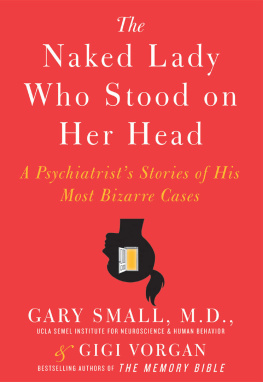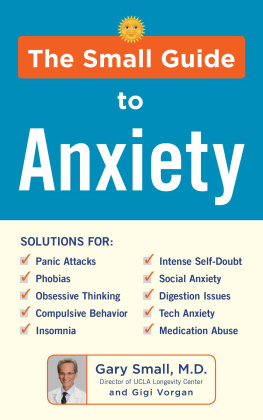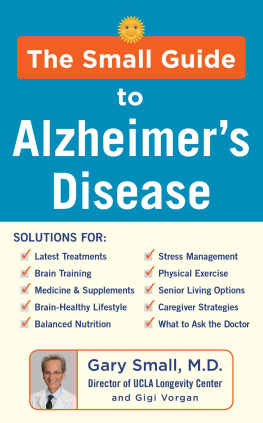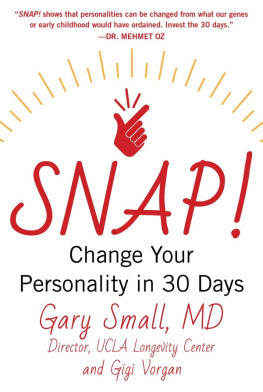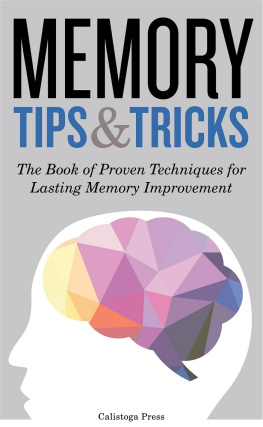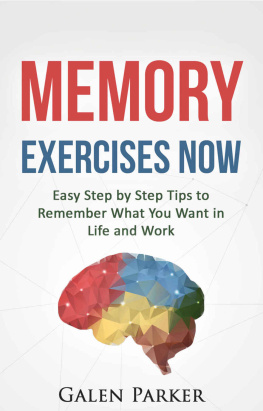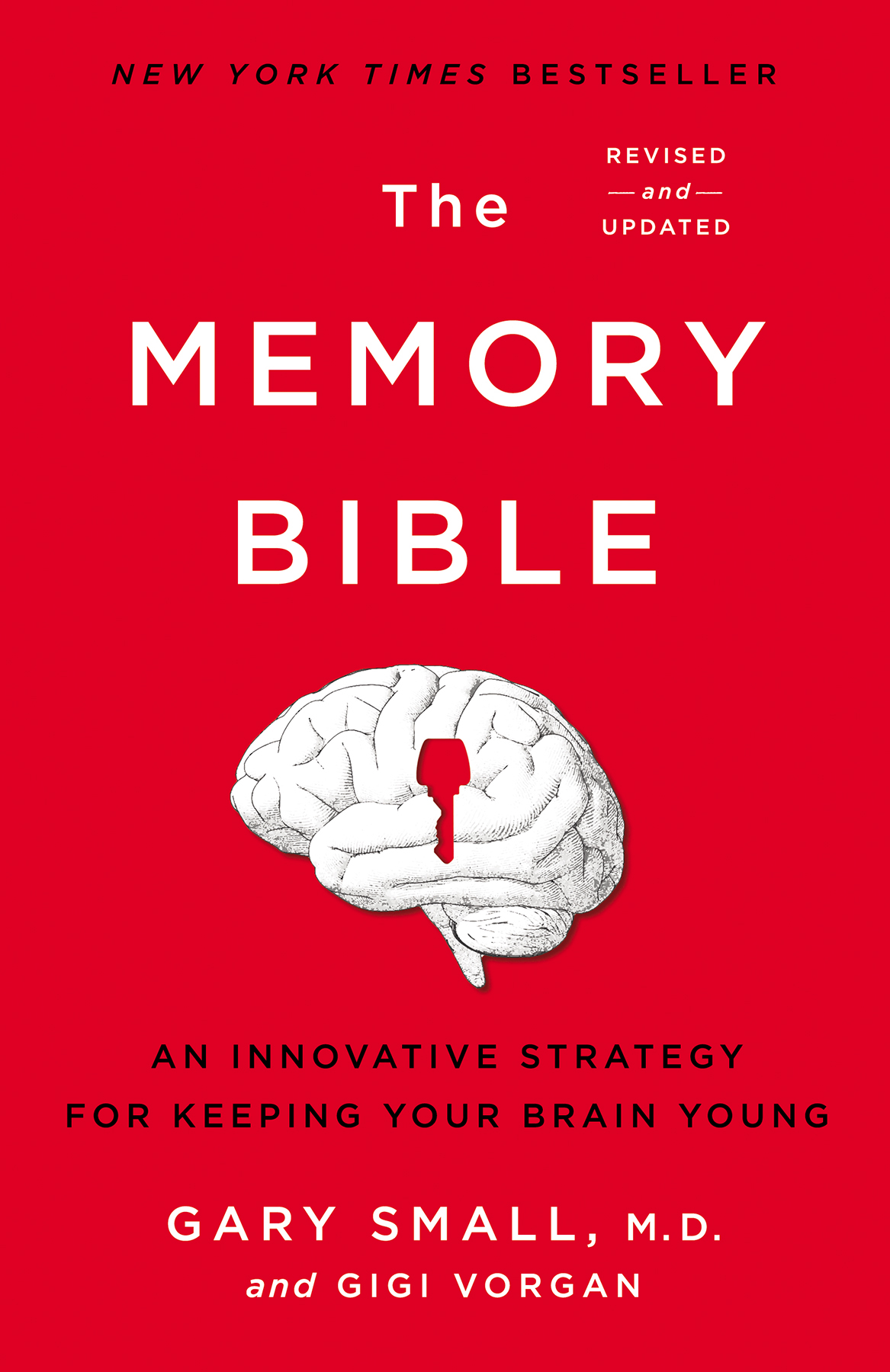
Copyright 2021 by Gary Small, MD, and Gigi Vorgan, 2002 by Gary Small, MD
Cover design by LeeAnn Falciani
Cover illustration Jolygon / Shutterstock
Cover copyright 2021 by Hachette Book Group, Inc.
The illustrations in were created by Diana Jacobs.
Hachette Book Group supports the right to free expression and the value of copyright. The purpose of copyright is to encourage writers and artists to produce the creative works that enrich our culture.
The scanning, uploading, and distribution of this book without permission is a theft of the authors intellectual property. If you would like permission to use material from the book (other than for review purposes), please contact permissions@hbgusa.com. Thank you for your support of the authors rights.
Hachette Go, an imprint of Hachette Books
Hachette Book Group
1290 Avenue of the Americas
New York, NY 10104
HachetteGo.com
Facebook.com/HachetteGo
Instagram.com/HachetteGo
Previously published by Hyperion: June 2002
First Hachette Go edition: June 2021
Hachette Books is a division of Hachette Book Group, Inc.
The Hachette Go and Hachette Books name and logos are trademarks of Hachette Book Group, Inc.
The publisher is not responsible for websites (or their content) that are not owned by the publisher.
Library of Congress Cataloging-in-Publication Data has been applied for.
ISBNs: 978-0-306-92535-1 (paperback); 978-0-306-84743-1 (ebook)
Note: The information in this book is true and complete to the best of our knowledge. This book is intended only as an informative guide for those wishing to know more about health issues. In no way is this book intended to replace, countermand, or conflict with the advice given to you by your own physician. The ultimate decision concerning care should be made between you and your doctor. We strongly recommend you follow his or her advice. Information in this book is general and is offered with no guarantees on the part of the authors or Hachette Go. The authors and publisher disclaim all liability in connection with the use of this book.
E3-20210420-JV-NF-ORI
Explore book giveaways, sneak peeks, deals, and more.
Tap here to learn more.

When The Memory Bible was first released nearly two decades ago, it surprised many people to learn that brain aging and memory loss begin as early as our twenties and thirties. Normal memory slips, such as forgetting where we put our keys or why we walked into a room, can begin this early and tend to get worse over the years. Eventually, memory issues can affect our daily functioning and productivity. The scientific research we described in the book revealed that initiating certain lifestyle habits, including regular exercise, healthy diet, stress management and mental stimulation, can not only slow or stop memory loss in its tracks, it can also help restore prior losses.
In the years since we wrote The Memory Bible (Gigi did not take credit on the original book), continuing research and development in early detection and treatment of brain aging have proven The Memory Bibles techniques successful. Our methods for improving and maintaining our cognitive strength still hold true today. Recent studies further substantiate the cognitive benefits of mental and physical exercise, as well as the benefits of stress management and a healthy diet. The latest science is compellingrevealing that these strategies not only boost memory and brain health but also lower the risk for developing Alzheimers disease and other forms of dementia.
Our memory-boosting methods were the impetus for the UCLA Longevity Center to develop memory education programs that are now available throughout the US. And our ongoing search for innovative methods has led to this new edition of The Memory Bible, which includes cutting-edge brain research, updated information on drugs and supplements, new techniques to overcome many top memory complaints, and more emphasis on such modern topics as stress management and technology.
Modern life continues to see more complications that endanger our brains. Progress in technology has brought us amazing gadgets, computers, phones, and tablets that can help embellish our memory and retention, but they can be detrimental if not used wisely. Engaging in too much technology can distract us, elevate stress levels, and impede memory abilities. And stress management, a factor in the original book, has become even more crucial in todays world of worries over pandemics, terrorism, economics, social unrest, and more. In updating this book, we have taken into account these complex changes to give you the tools to manage them.
Now that Gigi and I have become seniors ourselves, we are reaping the benefits of following our lifestyle program. We feel as healthy and sharp as we did when we first wrote The Memory Bible, and the content is more relevant than ever. In the following pages, you will learn to easily adjust your lifestyle to protect your memory and stave offor possibly avoidmemory loss or dementia during your long, healthy, and productive life.
Gary Small, MD
Gigi Vorgan
Weehawken, NJ, November 2020
Nearly everyone struggles with some form of memory loss before reaching middle age. Thanks to brain-imaging and genetic technologies, scientists can now observe the earliest physical indicators of brain aging in people as young as age 25. Tiny plaques and tangles that develop and grow ever denser in our brains often begin accumulating decades before any middle-age forgetfulness sets in. A minute spot of plaque on a 30-year-old brain could possibly indicate Alzheimers disease forty years from now, just as a tiny little snag of the dentists probe can mean a cavity in the making.
But we need not despair. Misplacing your keys a couple of times doesnt mean you should start labeling your cabinets. Memory loss is not an inevitable consequence of aging. Our brains can fight back, and The Memory Bible will give you the tools. We can improve our memory performance immediately and stave off, possibly even prevent, future memory decline. The sooner all of us begin our memory program, the sooner we will be on the path to keeping our brains young and healthy for the rest of our lives.
I have a photographic memory but once in a while I forget to take off the lens cap.
M ILTON B ERLE
Imagine struggling your way out the glass doors of a crowded mall in late December, loaded with shopping bags, packages, and presents. Your head is pounding and your feet hate you and the shoes you walked in on. Youd die of starvation this second if you werent already dying of thirst. You manage to pull out your car keys and glance up at the humongous, jam-packed parking structure when it hits youyouve forgotten where you parked.
Could never happen to you, you say? Ever forgotten your purse, wallet, or phone at home, only to remember it while caught in rush hour traffic? Maybe youve struggled to remember the name of a movie you saw last night or that new neighbor you just met, not five minutes ago. Ring a bell?
Most of us laugh off these so-called middle-aged pauses, considering them just another normal annoyance of aging, not a true memory problem, and certainly not a sign of Alzheimers diseasenot at our age. I hate to pop another I could party all night and still get to work on time if I wanted to baby-boomer bubble, but its time for us all to wake upwe are


